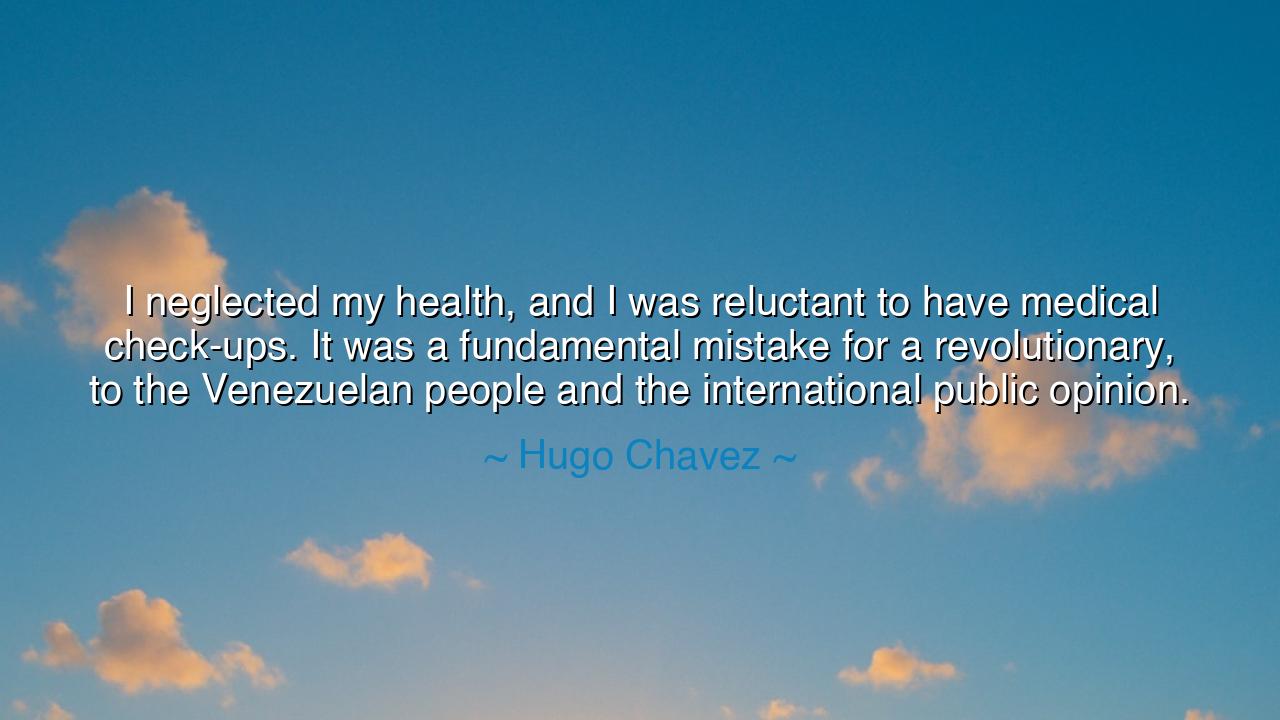
I neglected my health, and I was reluctant to have medical
I neglected my health, and I was reluctant to have medical check-ups. It was a fundamental mistake for a revolutionary, to the Venezuelan people and the international public opinion.






Hear, O children of struggle and destiny, the words of Hugo Chávez, the fiery voice of Venezuela, who confessed: “I neglected my health, and I was reluctant to have medical check-ups. It was a fundamental mistake for a revolutionary, to the Venezuelan people and the international public opinion.” These words, spoken not in triumph but in remorse, reveal the frailty that even the strongest leaders carry within them. They are a warning carved in flesh: that to fight for a cause yet abandon one’s own body is to endanger not only oneself, but the movement and the people one serves.
The origin of this saying lies in Chávez’s own decline, when illness, long unattended, weakened him in the midst of his political battles. A man who had rallied millions, who spoke of justice, independence, and revolution, found himself undone not by his enemies, but by his neglect of the vessel that bore his spirit. Thus he called it a “fundamental mistake”—for a revolutionary, whose life is not his own but belongs also to his people, must guard his body as carefully as his ideals. The cause requires strength, and strength requires health.
Consider the truth in this. A revolutionary is a flame, meant to inspire, to guide, to fight for the voiceless. But a flame without fuel cannot endure. To neglect health is to let the flame flicker and fade before its time. Chávez recognized too late that the battle for justice is fought not only in the streets, not only in the halls of power, but also within the heart and the body of the leader himself. The revolutionary must be whole, or the people will bear the weight of his fall.
History offers us echoes of this warning. Lenin, though mighty in vision, fell to illness before he could shape the future he dreamed, leaving Russia in the hands of others. Che Guevara, worn by asthma and fatigue, pressed on without regard for his weakness, and his frailty betrayed him in the jungles of Bolivia. Even the mighty emperors of Rome, who neglected balance in their living, were often undone not by swords but by disease. Again and again, history cries: neglect of health is neglect of duty.
Yet Chávez’s confession is not despair, but a lesson for all who hear it. To acknowledge failure is itself an act of courage, for it allows others to avoid the same path. He teaches us that even the strongest must tend to the simplest needs: rest, nourishment, and care. To honor one’s cause is also to honor one’s body, for without the body, the cause cannot be carried. It is not weakness to see a physician; it is wisdom. It is not selfish to preserve one’s life; it is service to those who depend on it.
The deeper meaning of his words reaches beyond politics. It touches every life. Parents who neglect their health leave children unprotected. Workers who drive themselves to exhaustion cannot sustain their families. Dreamers who burn without pause consume themselves before their dreams take shape. The lesson is universal: self-neglect is not sacrifice—it is sabotage.
Therefore, O listeners, let your practice be this: guard your health as a sacred trust. Seek check-ups not from fear, but from wisdom. Do not despise rest, for rest strengthens the warrior. Do not scorn nourishment, for it fuels the mind. Remember always that your life is not yours alone—it belongs to all who look to you, to your family, to your community, to your cause.
Thus let Chávez’s words endure: “It was a fundamental mistake for a revolutionary.” Take them as a summons to balance, to vigilance, to respect for the body that carries the spirit. For revolutions, great or small, are not sustained by fire alone, but by endurance. And endurance is born of health, faithfully guarded.






AAdministratorAdministrator
Welcome, honored guests. Please leave a comment, we will respond soon